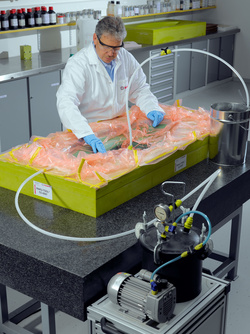Today, the importance of thermoset polymers with fiber reinforcement grows rapidly. Aiming at significant reduction of power consumption, manufacturers try to lower the weight of items while keeping their mechanical properties intact. This leads to more frequent use of composite parts for aviation, automotive and consumer goods applications. The newly developed epoxy infusion system RAKU-TOOL® EI-2500 / EH-2973 by RAMPF Tooling Solutions brings material performance and surface quality of products to a new level.
Compared to items made of metals, fiber composite parts boast high performance and are profitable even when produced in small and medium quantities. Namely, resin transfer molding (RTM) fits the needs of a wide scope of small- and medium-size manufacturers, while resin infusion (RI) is especially focused on prototypes, molds, and small-series production.
Any of these processes enables manufacture of parts with outstanding mechanical resilience thanks to typical fiber content of 50…60%. Thickness variation is reduced to a minimum; complex part geometries present no special problems neither.
Marcus Vohrer, Head of Application Engineering at RAMPF, says that the principal advantage of RI technology is high part quality, “especially in terms of air pockets.” On the other hand, “RTM process scores particularly highly on process reliability and reproducibility.” Both processes keep occupational health safe from risks, as “there’s hardly any contact with chemicals for staff,” as Mr. Vohrer adds.
Resin infusion (RI) production is carried out with a dry fiber composite package introduced in a mold. The mold is then supplemented with flow aids, peel ply, polymer ducts, and vacuum channels, and vacuum film is sealed. After having attained a stable vacuum, epoxy infusion system starts to impregnate the fiber composite package under the created pressure difference
Resin transfer molding (RTM) also involves a similar package (preform) insertion in a multipart mold. Vacuum is then created in a closed mold. Pressure difference drives the epoxy infusion system RAKU-TOOL into the mold through injection points; the package is thus impregnated. Operator can use a mold heater to reduce curing times.
The newly developed RAKU-TOOL® EI-2500 / EH-2973 epoxy infusion system, designed specifically for RI and RTM, provides its users with numerous benefits:
• Superb surface quality with Class A+ possible.
• Glass transition at 138 °C: Post-curing at 120 °C provides for ideal temperature resistance.
• Outstanding processing properties including optimum pot life, remarkable flow and degassing in vacuum, good hydrophily, and lengthy flow paths possible. These characteristics enable shorter setups, lower cost of processing, and less pinhole defects.
• Curing at ambient conditions ensures material stability and absence of brittleness after an overnight gelation, demolding ease with no need for pre-curing and no part warping, and immediate readiness of parts for processing/finishing.
RAKU-TOOL® range by RAMPF Tooling Solutions encompasses not only products for RI and RTM but a wide choice of sheet compounds, paste and liquid materials, and products for Close Contour Casting. These are used in mold engineering, modeling, jig and fixture design, and lightweight composites production including various processes such as vacuum bag, prepreg autoclave, compression molding or wet lamination.











